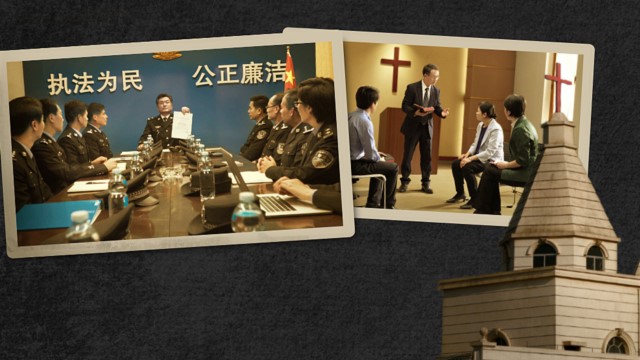Avoid the Jews’ Failure, Welcome Second Coming of Jesus
Now is already the last days, and also the key time for welcoming the Lord’s return. Speaking of welcoming the Lord, many brothers and sisters know that it’s an important thing that pertains to whether or not we can be brought into the kingdom of heaven. Once we miss the chance, we shall regret for the rest of our lives. Therefore, Sister Fang and I had a conversation about what is most essential to welcoming the Lord’s return.
Sister Fang began to say: “When it refers to welcoming the Lord, I will involuntarily think of when the Jews waited for Messiah. We all know that the Pharisees were the top leaders of the religious world at that time in Judea, who served Jehovah God in the temple from generation to generation. They knew the Bible well, kept to their ancestors’ teachings, appeared very pious, and often explained the Bible to the believers. They carefully read and studied the prophecies of Messiah’s coming, and they were so familiar with these prophecies that they could rattle them off backward. For these reasons, the Jews thought: As the Pharisees are people who serve God, if Messiah comes, they must be the first to know and accept Him. So they believed the Pharisees’ explanations of the prophecies pertaining to Messiah’s arrival without any doubt, and they didn’t at all consider whether these explanations were pure or fallacious.”
I continued to say: “You’re right. For example, the Bible prophesied, ‘Behold, a virgin shall conceive, and bear a son’ (Isaiah 7:14). Then the Pharisees explained it according to its literal meaning: Since it’s a virgin, she can’t have a husband. But the truth was that Maria had a husband, so they denied the Lord Jesus was Messiah. For another example, the Book of Isaiah said, ‘For to us a child is born, to us a son is given: and the government shall be on his shoulder … on the throne of David, and on his kingdom, to order it, and to establish it with judgment and with justice from now on even for ever’ (Isaiah 9:6–7). Then the Pharisees relied on their own notions and imaginations to explain them: Since the prophecy said Messiah would come to assume power, then He would certainly be born in a royal palace, would look handsome, mighty, extraordinary, and would lead them to overthrow the rule of Romans and rescue them from the suffering of being slaves to Roman government. But the Lord Jesus was born in a manger rather than in a palace, He looked ordinary and normal, He didn’t lead them to overthrow the rule of Roman government, and He taught people to be modest and tolerant, to forgive others, to love their enemies, and so on. As a result, they denied that the Lord Jesus was the appearance of God. Besides, the Bible said clearly that the coming One would be called Messiah, but the One who came was named Jesus. On this account, they judged that the Lord Jesus wasn’t the Messiah in their expectation.”
“Yeah! That’s it! The Jews believed such an idea of the Pharisees very much. They took their explanation of the literal meaning of the prophecies as basis for welcoming Messiah’s arrival, so they didn’t seek or examine the Lord Jesus’ work at all. They had seen the Lord Jesus perform many miracles among people—healing the sick, casting out the demons, making the blind see, the lame walk, and the lepers healed, feeding five thousand people with five loaves and two fish, even bringing the dead to life, and so on. They also felt shocked and convinced by these miracles, and thought they couldn’t be done by any ordinary person. But most of the Jews still listened to what the Pharisees said. When the Pharisees condemned the Lord Jesus’ work and blasphemed the Lord Jesus, saying that the Lord cast out devils by Beelzebub the prince of the devils, they had no discernment but blind belief of what the Pharisees said and followed them in condemning. When the Pharisees instigated them to ask for the Lord Jesus to be crucified, they also did their bidding. From this we see that the Jews believed in God but actually followed man: They believed the Pharisees’ explanations to the scriptures and obeyed their teachings, following them onto the path of believing in God but resisting God. They committed the monstrous sin of nailing the Lord Jesus to the cross, and lost forever the chance to gain God’s salvation.” Sister Fang said with emotion.
“Here, I see that even though the Pharisees served God for many years, they didn’t have the slightest knowledge of God, but were full of notions and imaginations about God. They used the letters of the Bible to define God, to resist God, and also to deceive and control man—they were precisely those who served God yet resisted God at the same time. How could God give revelation to them first and let them come before God? When the Jews believed and followed them instead of practically seeking and investigating the Lord’s work, didn’t it just reveal that these Jews were too stupid, ignorant, and undiscriminating, and were not the people who truly believed in God?
“But while the Lord was working, those who carefully listened to God’s words could recognize from God’s words and work that the Lord Jesus was the promised Messiah, then they accepted and followed Him, and thus gained God’s salvation. The Samaritan woman was an example. Through talking with the Lord, she found that the Lord could tell what was hidden deep in her heart and could answer her question: One shall worship God neither in this mountain, nor in Jerusalem, but with heart and honesty. Thus the Samarian woman recognized that the Lord Jesus was the coming Messiah (See John 4:7–29). And there was also Peter. From the Lord Jesus’ disposition revealed in His words, actions, and work, he saw that what the Lord Jesus had and was couldn’t be possessed by anyone, so he gained the Holy Spirit’s enlightenment and recognized the Lord Jesus was the Christ, the Son of the living God (See Matthew 16:15–17). And so on. These people were quite pure, and in welcoming the Messiah they all had a modest and seeking heart. They didn’t blindly adore or follow people, but just tried to affirm whether it was God’s appearance through the Lord Jesus’ words and work, thereby gaining the salvation of God and being approved by God. From this it can be seen that God is righteous, and that He never gives anyone special treatment.”
As I finished saying this, Sister Fang followed to say: “If those Jews hadn’t blindly followed and listened to the Pharisees’ teachings, nor lived in their own notions and imaginations to rigidly stick to the words of the prophecies, but had a humble heart that sought and thirsted for the truth like Peter and John, they wouldn’t have been abandoned by God. Unfortunately, although they believed in God, the status of man was too high in their heart, and they didn’t have a principle to welcome the Lord!”
“Yeah,” I said. “Although the case of how the Jews welcomed Messiah is already past, it’s really a warning for people nowadays. When facing the Lord Jesus’ return, how should we do to avoid making the same mistake as the Jews?”
“That’s true,” Sister Fang agreed. “Sister Zheng, the error of the Jews was that they blindly listened to the Pharisees’ words, only relied on the literal meaning of the Bible explained by the Pharisees to wait for Messiah’s coming, but didn’t focus on listening to God’s voice. Likewise, to avoid walking the same wrong path as them, we shouldn’t blindly listen to the words of the pastors and elders just because they know the Bible well. If what they say is in accordance with the truth, and their acceptance not fallacious, then we should listen and obey; if not, we shouldn’t accept it. Otherwise we could easily miss the chance to welcome the Lord, and lose God’s salvation. Recently, I saw in a gospel website that the Bible records two kinds of scriptures about the Lord’s return: One is to come upon a cloud; the other is to come in secret. I read the Bible carefully, and there were such verses: ‘Behold, I come as a thief’ (Revelation 16:15), ‘And at midnight there was a cry made, Behold, the bridegroom comes; go you out to meet him’ (Matthew 25:6). However, the pastors and elders’ usual saying is that the Lord will come upon a cloud. If we only hold on to the prophecy of the Lord descending on a cloud, but ignore the prophecies of the Lord’s secret descent, then we’ll miss the opportunity of being raptured into the kingdom of heaven. This makes me reflect: In treating the Lord’s return, we can’t blindly listen to what the pastors and elders say; the most essential thing is to hear the voice of God. Just as the Lord Jesus’ word said, ‘My sheep hear my voice, and I know them, and they follow me’ (John 10:27).”
“Mm, from listening to your words, I think of what the Lord prophesied when it comes to welcoming His return: ‘I have yet many things to say to you, but you cannot bear them now. However, when he, the Spirit of truth, is come, he will guide you into all truth: for he shall not speak of himself; but whatever he shall hear, that shall he speak: and he will show you things to come’ (John 16:12–13). This shows us that when the Lord returns, He will speak and utter His words. So, in welcoming the Lord, we must pay attention to where the Lord expresses His words, to knowing God and following God from His words, just like Peter and the others at that time.” I said excitedly.
“Yes. The Lord Jesus also said, ‘Behold, I stand at the door, and knock: if any man hear my voice, and open the door, I will come in to him, and will sup with him, and he with me’ (Revelation 3:20). And the Revelation mentions many times, ‘He that has an ear, let him hear what the Spirit says to the churches.’ From this we can see that, with regard to the Lord’s return, we must be heedful of the voice and word of the Holy Spirit. This is most essential to welcoming the Lord’s arrival.”
Having said this much, Sister Fang and I nodded simultaneously.





